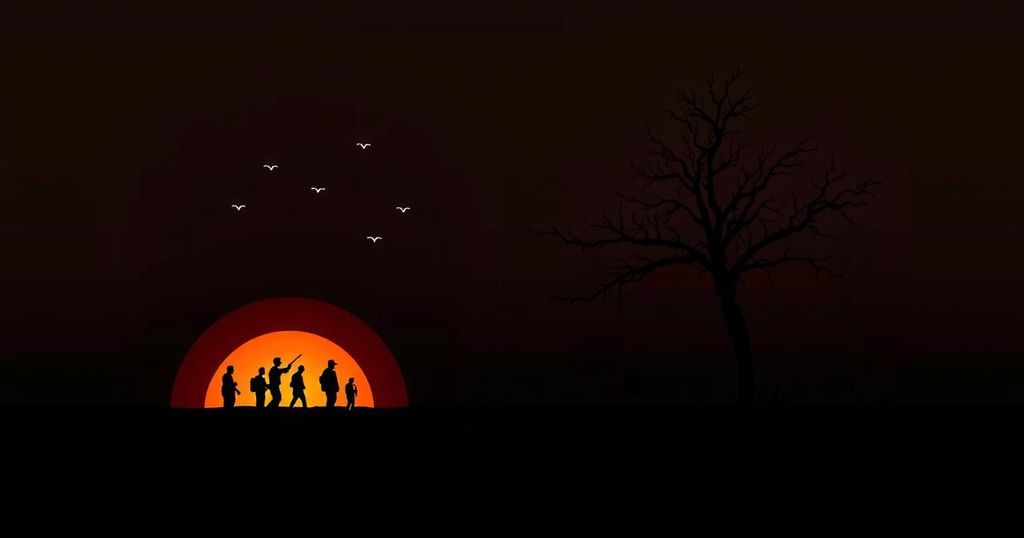The Ongoing Conflict in Sudan: A Left Perspective on the Civil War and Its Implications
Summary
The civil war in Sudan has resulted in over 10 million internally displaced persons and widespread food insecurity as factions vie for control amidst external interference primarily by Egypt and the UAE. Activists continue to rally for justice and democracy despite the overwhelming challenges posed by the conflict, highlighting the exploitation of Sudan’s resources by foreign powers.
The ongoing civil war in Sudan, primarily between the Sudanese Armed Forces (SAF) and the paramilitary Rapid Support Forces (RSF), has caused extensive disruption and suffering within the nation. Following the successful uprising against long-time dictator Omar al-Bashir in April 2019, which promised a path toward civilian democracy, the Sudanese populace has faced a severe setback after a military coup in 2021 solidified the military’s authority. Over 10 million individuals have been internally displaced, with about 70% of the population currently facing the threat of famine. On July 18, a press event organized by the International Peoples’ Assembly, Peoples Dispatch, and Madaar convened to amplify the voices of left movements within Sudan, highlighting their continued advocacy for justice and democracy despite the ongoing conflict. Central to the discussions were prominent activists, including Niamat Kuku from the Sudanese Communist Party, Randa Mohammed from the Sudanese Women’s Union, and Dr. Ihssane Fagiri, a key advisor within the Doctors’ Sector of the Communist Party. These activists presented insights into the dire effects of war on Sudanese society, particularly on the health sector and women, who continue to strive for democracy amid challenging circumstances. The civil war’s origins are rooted in socio-economic strife concerning Sudan’s valuable national resources, which have become focal points for external interests, notably from Egypt and the UAE. Egypt has aligned itself with SAF, while the UAE has provided support to RSF, complicating the internal power dynamics. This situation has been exacerbated by the resurgence of political Islam within military ranks and the manipulation of regional powers that aim to control Sudan’s resources for their geopolitical ends. The continued conflict has led to significant humanitarian crises, with millions suffering from food insecurity and lack of adequate assistance. International humanitarian aid efforts have faltered, leaving local organizations and committees to address the dire needs of the populace. Thus, Sudan’s current state reflects a battlefield influenced by larger imperialistic pursuits rather than a concerted effort to restore peace and prosperity locally. In conclusion, the situation reflects a tragic consequence of a civil society’s struggle against militaristic control, influenced by regional interests and resource ambitions. The people of Sudan remain resilient, seeking democratically-oriented solutions amidst overwhelming challenges.
The civil war in Sudan arises from a historical context of the Sudanese people’s fight for true democracy, especially following the significant political shifts that culminated in the 2019 overthrow of dictator Omar al-Bashir. This period saw a surge in demands for civilian governance, but the subsequent military coup in 2021 subverted those aspirations. The conflict involves powerful military factions—the Sudanese Armed Forces and the Rapid Support Forces—each supported by external actors with vested interests in Sudan’s abundant natural resources, which include fertile land, freshwater, and minerals. This geopolitical tug-of-war significantly intensifies the internal strife and humanitarian crises facing the nation.
Sudan’s civil war exemplifies not just an internal power struggle but a clash intimately tied to external imperialistic ambitions. The Sudanese people, despite facing immense hardships, continue to fight for a democratic future, emphasizing the need for solidarity and support from the global community to address the escalating crises. Protecting the nation’s sovereignty and resources must align with popular demands for democracy, justice, and peace.
Original Source: www.newsclick.in








Post Comment